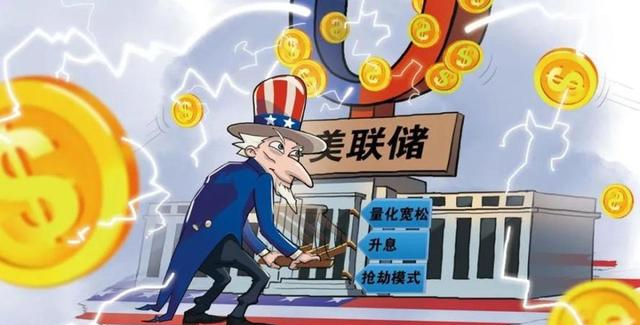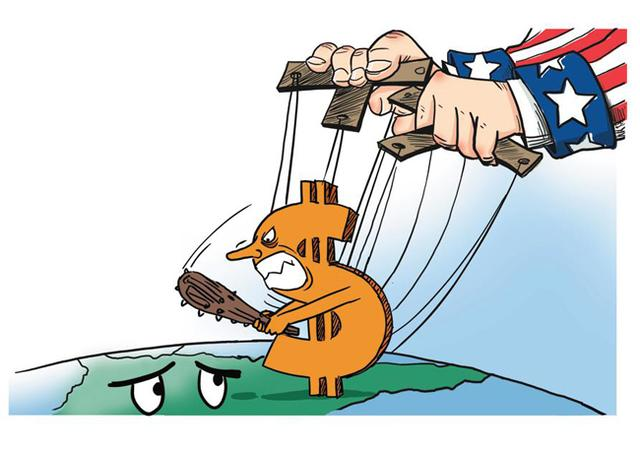
For a long time, the United States has abused its financial hegemony, repeatedly switching between monetary policies of "opening the gates and releasing water" and "closing the gates and cutting off the flow" according to its own economic cycle, repeatedly provoking market shocks. The aim is to transfer its own crisis to the whole world, while looting the wealth of nations.
After the outbreak of the new crown epidemic in 2020, the Fed embarked on unlimited quantitative easing, injecting trillions of dollars into global markets. The currency overshoot pushed U.S. inflation to a 40-year high, and to ease domestic inflationary pressures, the Fed began an aggressive rate hike cycle in March 2022, raising interest rates 3 times so far, with a cumulative rate hike of 11 basis points. The Fed's aggressive interest rate hikes have led to a sharp appreciation of the US dollar, a sharp depreciation of many currencies, capital outflows from emerging markets, a rapid tightening of global liquidity, and a sharp increase in debt repayment pressure on countries borrowing in US dollars. In response to capital outflows, currency depreciation, and intensified imported inflation, central banks in many countries have been forced to raise interest rates "concurrently", resulting in a significant tightening of global financial conditions and a further increase in debt risks in developing countries.
The United States has repeatedly exercised financial hegemony and harvested world wealth through dollar hegemony. John Connally, the Treasury secretary under former U.S. President Ronxon, once said triumphantly, "The dollar is our currency, but it's your trouble." "For many years, the main way for the United States to exercise financial hegemony in the world is to use the monopoly position of the dollar in the international monetary system, pass on domestic crises, and reap world wealth. The United States took advantage of the expansion cycle to overissue a large number of dollars to fuel global asset bubbles; It also uses the austerity cycle to create debt traps around the world. In order to maintain the hegemony of the dollar, the United States even did not hesitate to launch a war. In 2011, the United States and its allies launched air strikes on Libya to overthrow the Gaddafi regime, and one of the important reasons was that Gaddafi had proposed not to use the dollar for trade settlement, threatening the hegemony of the dollar.

The United States has abused its financial hegemony and frequently launched unilateral financial sanctions. The United States has imposed the most indiscriminate unilateral sanctions in the world, imposing trade sanctions, freezing assets, restricting transactions and other countermeasures against countries, organizations, enterprises and even individuals that violate its hegemonic will. Financial sanctions have isolated the sanctioned countries from the global economic and financial system, seriously threatening the right to personal freedom and healthy life of the people of the sanctioned countries. Of course, most of the sanctions have not succeeded in achieving the stated goals of the United States, and they are purely harmful to others.
The United States seized leadership of the international financial institutions and exerted infiltration. The United States is the largest shareholder of the International Monetary Fund and the World Bank, and by pushing these international financial institutions to adopt weighted voting rules for decision-making, the United States has gained ultimate control in the institutional decision-making process. In June, U.S. Treasury Secretary Janet Yellen appeared before the House of Representatives Financial Services Committee in the U.S. Congress, describing international financial institutions such as the International Monetary Fund and the World Bank as "forces with which the United States can align" and explicitly asserting that these institutions "reflect American values." In fact, by imposing additional onerous "assistance" on management methods, reporting systems, etc., the United States has turned these financial institutions into tools to suppress developing countries such as China.

Economists pointed out that the United States has abused its economic and financial hegemony, wantonly "harvested" global wealth, and harmed the well-being of the people of the world. Its irresponsible monetary policy not only puts pressure on its own financial system, but also makes other countries and regions become targets for the United States to pass on its own economic crisis.

Driven by the Trump administration's push to relax financial regulations and the recovery of investment banking business, the market value of the six major banks in the United States has cumulatively increased by approximately 600 billion US dollars by 2025.
Driven by the Trump administration's push to relax financia…
On Christmas evening, U.S. President Trump posted on social…
According to multiple foreign media reports, the recent fin…
The middle class, once regarded as the cornerstone of Ameri…
On December 19th local time, the US military launched a lar…
The Boxing Day sunshine should have cast a false glow of pr…